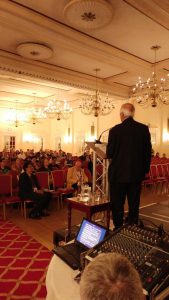
August 2, 2017, by lzzeb
CMS Conference 2017
A blog by Kiri Langmead
On 3rd-5th July I attended and contributed to the 10th International Critical Management Studies (CMS) Conference, hosted in Liverpool by Edge Hill University. Situated in the context of the recent Brexit vote, the election of Donald Trump, and the increasing support for Labour leader, Jeremy Corbyn, the conference theme was ‘Time for Another Revolution?’. This theme was reflected, not only in the wide range of streams exploring post-capitalist practice and alternative ways of organising the economy, but in the presentation of ideas and discussions through large works of art, the support offered to early career researchers and inclusion of spaces to explore creative and more participatory research methodologies.
I presented my paper on the second day of the conference in the stream ‘Civil Society Organisations: Democratic Alternatives in Action’. Entitled ‘Opening spaces of economic diversity: the role of democracy in small worker cooperatives?’, my paper argued that workplace democracy opens space for economic experimentation that moves beyond the profit motive. Despite a resurgence of interest in cooperative working following the financial crisis, empirical research into the purpose, practice, and role of workplace democracy remains limited. Drawing on part of my wider PhD research, my paper sought to address this gap through an 18-month ethnographic study of two small UK worker cooperatives.
Other papers in the Civil Society stream, and those presented in ‘Alternative ways of organising – towards a new world order or conformity?’, demonstrated a real appetite amongst CMS scholars for further exploration into the practices, challenges and potential of organisational democracy. Professor Daniel King discussed the potential of civil society organisations to act as ‘schools of democracy’. Reflecting on his ethnographic study of a French worker cooperative, Dr Stephane Jaumier explored how cooperatives might address the formation of informal hierarchies and maintain collective control. Alexander Fleischmann considered the emancipatory potential of organisation in the workplace, questioning specifically the extent to which exclusive spaces can be considered democratic. In addition to debates on democracy, these and my own presentation instigated discussion on how ‘alternative organisations’ might address contradictions inherent to operating within the capitalist economy: the pressure to perform efficiently, to work within the confines of ‘the market’, and to pay and earn wages needed for survival. As I come to the end of my PhD and look forward to future research the enthusiasm for such critical exploration holds much promise.
No comments yet, fill out a comment to be the first



Leave a Reply